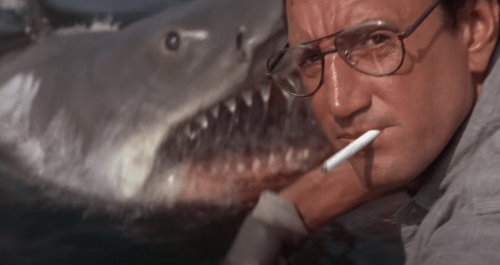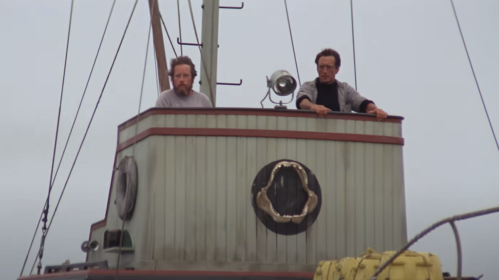Steven Spielberg Admits Iconic Movie Had a Negative Impact: "I Really, Truly Regret That."
The director addressed an unfortunate effect his blockbuster Jaws had on the real world.

Steven Spielberg has directed a number of iconic movies during his career, from E.T. to Indiana Jones to Jurassic Park. But, there's one famous movie from his filmography about which he has a very particular regret. In 1975, Spielberg's film Jaws, a thriller about the hunt for a great white shark attacking citizens of a New England town, was released and went on to be a major hit. But while the movie was a huge success in every way and is still considered a classic today, there's a lingering effect from the film that the filmmaker said in a new interview he still regrets. Read on to find out more.
READ THIS NEXT: 7 Classic Movies That You Can't Watch Anywhere.
Jaws was a box office and critical hit.

Jaws is based on the 1974 book of the same name by Peter Benchley. The movie was a massive hit when it was released in 1975 and is considered to be the first blockbuster movie. It was also critically acclaimed and awarded a variety of honors, including a nomination for Best Picture at the Academy Awards. It was followed up by three sequels and is now considered to be one of the greatest movies of all time.
Spielberg admitted that he's worry for one aspect of the film's legacy.

The threat of Jaws' deadly shark stuck with a portion of the movie's large audience. Some were inspired to hunt sharks themselves and many others were given a misperception of sharks and their behavior. Spielberg regrets his role in this cultural phenomenon.
The director was the guest on the Dec. 18 episode of BBC Radio 4's Desert Island Discs, a show in which interviewees share the eight songs they'd want to listen to if stranded on a desert island. In the interview, Spielberg was asked how he would feel if his fictional desert island was surrounded by sharks.
"That's one of the things I still fear," he said. "Not to get eaten by a shark, but that sharks are somehow mad at me for the feeding frenzy of crazy sport fishermen that happened after 1975."
He continued, "I truly and to this day regret the decimation of the shark population because of the book and the film. I really, truly regret that."
For more celebrity news delivered right to your inbox, sign up for our daily newsletter.
The movie (and book) indirectly led to a decline in the shark population.

As Spielberg noted, the release of Jaws is said to have contributed to the decline in the shark population, as well as contributing to people's fear of sharks, which has been called "The Jaws Effect." Some viewers walked away from the movie believing that sharks could be vengeful and seek out humans to kill.
In 2015, Oliver Crimmen from London's Natural History Museum told the BBC, "Jaws was a turning point for great white sharks. I actually saw a big change happen in the public and scientific perception of sharks when Peter Benchley's book Jaws was published and then subsequently made into a film."
George Burgess, director of the Florida Program for Shark Research, told BBC, "A collective testosterone rush certainly swept through the east coast of the US. Thousands of fishers set out to catch trophy sharks after seeing Jaws." Burgess added, "You didn't have to have a fancy boat or gear—an average Joe could catch big fish, and there was no remorse, since there was this mindset that they were man-killers."
That said, the BBC article notes that while shark populations declined greatly in the years after the release of Jaws, sport hunting would only have been a small part problem with the bigger issue being commercial fishing.
The author of the book spoke out, too.

Benchley, who died in 2006, also expressed regret about the novel's influence on readers' feelings about sharks.
"What I now know, which wasn't known when I wrote Jaws, is that there is no such thing as a rogue shark which develops a taste for human flesh. No one appreciates how vulnerable they are to destruction," he told Animal Attack Files (via Boston.com).
Benchley went on to become an ocean conservationist.





















